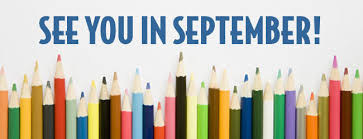Este será el último post del curso, como hemos visto a lo largo de esta semana, han sido muchos los momentos especiales, los proyectos y los aprendizajes. Estoy seguro de que para todos nosotros ha sido un curso especial por uno u otros motivos pero dentro de nosotros nos llevamos algo que recordaremos durante el verano, el próximo curso o quizás para el resto de nuestras vidas.
A lo largo del verano quiero que disfrutéis mucho que os lo habéis ganado. ¿Deberes? No de forma estructurada pero ayudado de un gran amigo Manu Velasco y su blog os voy a pedir una serie de cosas que os ayudarán a disfrutar más plenamente de él.
Os voy a pedir que realicéis un post que será vuestro cuaderno de campo del verano (recordad que el post se puede ir dejando en borrado mientras vais creando hasta la publicación final). En el mismo incluiréis todo lo que vayáis realizando a lo largo del verano de la siguiente lista:
- Lee un par de libros los que te gusten, realiza una recomendación de uno de ellos en el blog.
- Planifica una ruta por el bosque con tu familia, calcula los km, lo que vais a ver, donde podéis comer, un pequeño presupuesto. A lo largo de la misma toma fotos, con todo ello prepara una presentación y colócala en el post. ¿Por qué no investigas un poco sobre alguna especie de flora o fauna de la zona para contárselo a tu familia?
- Ve al cine, disfruta de una peli en familia. Realiza un pequeño resumen de la película con los datos principales, actores, director, año de grabación, productora, etc.... Escribe todo ello en tu post.
- Disfruta de una puesta de sol y las estrellas. Te recomiendo la lluvia de perséidas o Lágrimas de San Lorenzo que tendrá lugar la noche del 11 de Agosto. Toma algunas fotos y cuenta un poco cómo has disfrutado con ello.
- Escribe una carta o postal en inglés a algún compañero al que echas de menos, a tu profe o alguno de los niños que participaron en el intercambio. Recuerda cuida tu ortografía y gramática.
- Escribe un diario del verano, puedes hacerlo a través de un drive o en un cuaderno. Pero refleja los momentos importantes en él, es la mejor manera de recordar.
Si todo esto se os queda corto en la siguiente infografía Manu Velasco os hace más propuestas: Blog de Manu Velasco - Placeres de Verano para alumnos y profes.
Ahora os digo a vosotros padres si alguno consideráis que vuestro hijo necesita otro tipo de "deberes" os recomendamos el libro de vacaciones de SM 5ºEP








